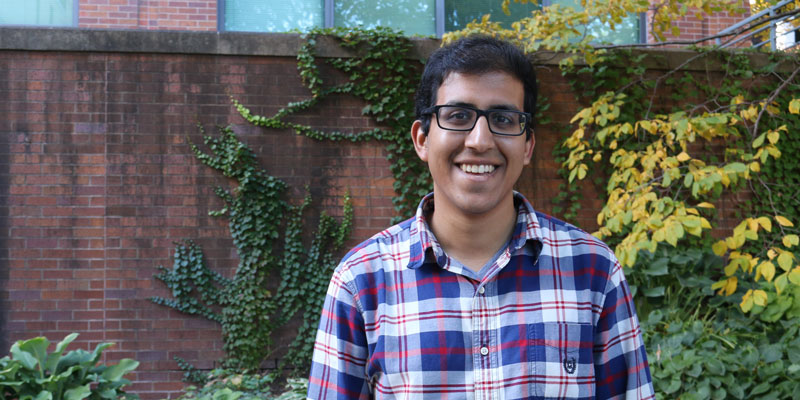The Plant and Microbial Biology Ph.D. candidate talks about what appeals to him about research, the importance of field work and his advice for those just starting out in grad school.

Shan Kothari is wrapping up his dissertation in the Cavender-Bares lab with the support of the Doctoral Dissertation Fellowship. He spent three summers at Cedar Creek Ecosystem Science Reserve, volunteers with Market Science, is involved with PMB graduate student life and recently co-organized a symposium on Ecosystem Effects of Solar Geoengineering through the support of the Institute on the Environment.
Hometown
Canton, MI
What are you studying?
I study plant communities and the ways they interact with their light environment. What counts as too much or not enough light? And how could excess light be a bad thing? During my fieldwork in a tree diversity experiment at Cedar Creek, I noticed that some species seemed to do better growing in the shade of large neighbors than in monoculture. Those observations helped me realize that photoprotection — protection from excess light — is a core part of plant function.
You’re interested in pursuing a research postdoc following your defense. What helped you solidify your decision to continue in research?
I really like the work I do, both because I think it’s important and because it allows me to spend time with my brilliant and endlessly interesting colleagues. The three summers that I spent at Cedar Creek, with the research community there, have really helped my love of ecology grow. Every time I go into the field, I come out with new ideas to test, and I can’t bear the thought of not being able to do so.
What has surprised you most so far during your studies?
When I started graduate school, I really thought I could generate ideas and questions out of thin air by knowing enough ecological theory, but most of my best ideas have come from spending a lot of time in the field throughout the year. My favorite projects started by just noticing the ways plants defy my expectations.
What’s your advice for incoming graduate students?
It helps to work in public sometimes, just to allow spontaneous conversations with friends and colleagues. I’ve learned a lot from those chance discussions!
Recently Plant and Microbial Biology stopped requiring GRE scores in the admission process. You helped push for this change. What motivated you?
There’s been a movement across universities and online (hashtag #GRExit) to remove the GRE from the admissions process. The GRE is expensive, and in many places, testing centers are hard to find. This evident barrier to inclusivity -- and a hint of residual resentment at having paid all that money myself -- fired me up enough to send an email asking why we couldn’t just drop it. The PMB administration was very open to the idea, and I’m glad they were willing to take up the issue with the faculty.
Outside of courses and research, what else keeps you busy on campus?
I just recently co-organized a symposium with my colleague and friend Sumil Thakrar. The topic is solar geoengineering and its potential consequences for the natural world. Solar geoengineering would aim to mitigate climate change by injecting sulfate aerosols into the stratosphere, which would deflect a small amount of sunlight away from Earth’s surface. However, we don’t know what side-effects this technology could have for the natural world. The Institute on the Environment gave us funds to invite a few speakers to talk about how we could better understand these consequences.
I also co-organize a weekly discussion group about plant physiological ecology, perform with a Javanese gamelan ensemble and volunteer for Market Science.
What’s your favorite place to work?
Anywhere except my dreary, windowless office! On campus, I like the nooks and lounges within the Ecology building.